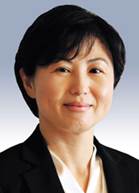
Executive Power, Presidentialism, and the Unitary Executive
Dr. Yi is professor of the Political Science & International Relations Department at the Seoul National University, where she teaches ‘Decision-making Process in U.S. Politics,’ and ‘Comparative Federalism.’ Her research focuses on comparative politics with a special interest in federalism. Some of her recent publications include, American Democracy in a Kaleidoscope (in Korean), Comparative Federalism In Pursuit of Integration and Decentralization (in Korean), and From Division-Unification to Separation-Integration (co-authored, in Korean). She is currently Director of American Studies at the Seoul National University. Dr. Yi was a visiting Research Fellow at the International Forum for U.S. Studies at the University of Illinois at Urbana-Champaign from February 2015 through April of 2015.
Dr. David Schrag for IFUSS: In some of your recent work, you write how the U.S. government was built on the principle of presidentialism. Could you explain this term—for example, how was this concept intended by the founders, or supported by the Constitution?
Dr. Okyeon Yi: The principle of federalism complements the principle of separation of power in the U.S. government. It was only after the constitutional convention specified the presidency in the Constitution that presidentialism became operative in tandem with checks and balances. Thus some still prefer the term ‘separation of power’ to that of presdientialism.
IFUSS: In terms of presendentialism, how does the U.S. differ from other democracies and what is the effect of U.S. style presidentialism on domestic and foreign policy?
OY: Even though all types of presidentialism embody a unitary executive, the U.S. presidentialism was and still is devised for the purpose of collective decision-making between the executive and legislative branches of government on both domestic and foreign policy. Such collective decision-making may, at times, exacerbate the problem of dual legitimacy. However, U.S. presidentialism contrasts with other varieties of presidentialism in that its Constitution survived many arduous contestations both under unified and divided governments in its original form.
IFUSS: What is the effect of presidentialism on domestic and foreign policy?
OY: The Constitution is silent on many foreign policy realms, which, in turn, emboldens entrepreneurial presidents to expand presidential powers, first, on foreign policy and then, by claiming their prerogative powers, on domestic realms by extension. The end of World War I ushered in the era of the assertive presidency in which presidents claimed their prerogative to interpret the Constitution, even in opposition to Congress.
IFUSS: You discuss the concept and practice of executive unilateralism. Is this an issue of particular concern for the future of all democratic countries, especially in relation to post-9/11 “state of emergency” politics?
OY: Separation of power was not designed specifically to deter the unitary executive per se, but to respect the claims of individual rights by restricting presidential powers explicitly delegated to the presidency. Yet wartime democracy—or times of crisis, in general—necessitates the suspension of even habeas corpus for the sake of national security. In that sense, presidentialism may lead to executive unilateralism.
IFUSS: What is the role of rhetoric and persuasion in relation to a president’s mandate to represent the people? How important is a popular mandate for presidential governance in the U.S. and in other democracies such as South Korea?
OY: Popular mandate is not grounded on the Constitution. Yet as the sole office holder elected by the eligible national constituency, the President can and does claim to represent the entire nation both on foreign and domestic policy. Some presidents choose to ‘go public’—even bypassing Congress just to pressure Congress into complying with the President. Furthermore, the incumbent president can build on precedents accumulated by his/her predecessors when acting on his/her rhetoric, which is often observed in other presidentialisms, including South Korea.
IFUSS: In speaking about the U.S., you have noted that one of the tasks president Obama had cut out for him was to “restore the robust yet accountable presidency.” In what ways are robustness and accountability generally at odds in a presidency and what do you think Obama has accomplished in this regard?
OY: Succeeding George W. Bush, President Obama had to trace a fine line between executive unilateralism and an assertive unitary executive, especially under divided government. When polarization imperils not only a legislative process but also the confirmation of presidential appointees, President Obama might have been tempted to issue executive orders instead of letting Congress procrastinate on his top-priority policies. This could have further aggravated the defiant Congress, but the re-elected Obama would want to build his legacy by proclaiming his prerogative powers to rule on behalf of the nation. In the foreign policy realm, for example, President Obama was confronted with unprecedentedly recalcitrant lawmakers when 48 senators signed the dissenting letter to Teheran over a nuclear deal. In the domestic policy realm, his health care overhaul and immigration reform were repeatedly challenged by several state governments as well as the Republican lawmakers who vowed to repeal them. In this respect, President Obama, like his predecessors, would have found robustness and accountability at odds under presidentialism. Yet he has been persistent in turning a niche to his favor, which might have exacerbated his congressional liaison.
Dr. David Schrag is Program Coordinator for the International Forum for U.S. Studies (IFUSS) at the University of Illinois at Urbana-Champaign.


